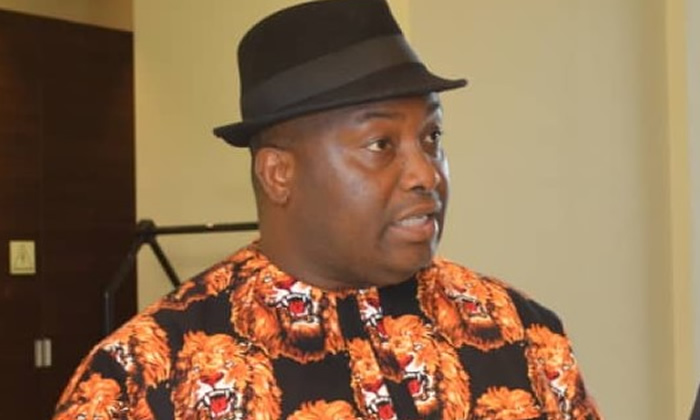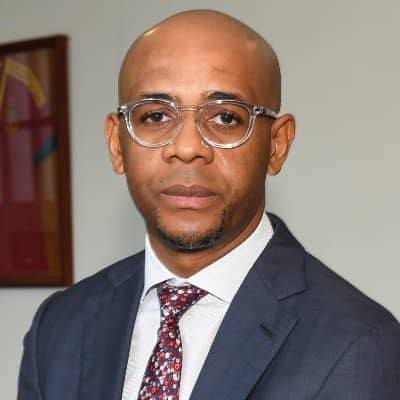
MANASSEH MBACHI writes on the plight of residents of some local government areas in Benue State who are left without health services. They face preventable deaths of loved ones and have to travel far to seek medical attention. Despite government having budgeted huge sums of money to cater for its general hospitals in these areas, the facilities are in pitiable conditions
Nkem Igweike was just a month into his mandatory one-year service in the National Youth Service Corps (NYSC) in Buruku Local Government Area of Benue State when he fell seriously ill on the night of October 1, 2024.
The following morning, a doctor attended to him at the General Hospital, Buruku and prescribed some drugs. However, the pharmacist was not on duty. “I waited for over two hours, still in pain,” Mr Igweike said.

Nkem Igweike
When the pharmacist eventually arrived, the patient was confronted with another disappointment.The hospital had only two of the five drugs prescribed.
“I was told to go to Gboko—over 50 kilometres away—to buy the medicine.”
Ill-equipped General Hospital
Ewada Inalegwu, the assistant secretary of General Hospital, Buruku, said the facility is ill-equipped for its role as a secondary healthcare service provider. He said the hospital is grossly understaffed and does not have an ambulance or any vehicle that can be used in emergencies.
“We don’t even have inexperienced staff, let alone experienced ones,” he said. He said the few health workers do multiple shifts to cover the manpower shortage. “It is incredibly overwhelming,” Mr Inalegwu lamented.

Patients emergency cupboard
“We frequently refer patients to the teaching hospital,” he explained. “We have only one full-time doctor. The other doctor is an NYSC member who will soon complete his service. Doctors in the state are currently on strike, so that one corps member is working around the clock,” he said.
Mkem narrating his ordeal
Aja Ewa, the medical doctor posted by the NYSC to General Hospital Buruku, described the lack of basic facilities at the hospital as frustrating. “There are essential resources that every general hospital should have, yet they’re simply not available here,” he said. “The hospital is severely understaffed. With state doctors currently on strike, I’m covering both day and night shifts.”
Mr Ewa recalled a recent incident. “A patient needed to be placed on oxygen but we had no oxygen in the facility, so we had to refer them to the teaching hospital. Only God knows the patient’s fate after that,” he said.
“We don’t even have an X-ray machine,” Dr Ewa continued. “Basic tests like Electrolytes, Urea, and Creatinine (EUCR), which are standard initial tests for any patient, can’t be done because we don’t have the equipment. We cannot run even a full blood count test, yet these are routine procedures in any general hospital.
“The theater is under-equipped. Many of our instruments are incomplete, and sometimes we have to delay surgeries until we can borrow what we need from private facilities, especially in emergencies,” he said. “There are surgeries where oxygen should be on standby, but without it, we are forced to refer patients elsewhere. Pediatric cases are often referred too, as we don’t have an incubator.”

Hospital’s store room
Since his posting, Dr. Ewa’s schedule has left him virtually on call 24 hours a day. “Whenever a patient arrives, I’m immediately called in. I don’t have time for any personal activities I would normally enjoy as a doctor. I love football, but I can hardly ever play now,” he said with a sigh. “Even Gboko close by, I hardly visit. Sometimes I’m on my way somewhere, and a call comes that a patient needs urgent attention, and I have to turn back. I once had a banking issue that took over two months to resolve because I couldn’t find time to go there—it’s that bad.”
Buruku hospital staff quarters
Absence of scanning equipment creates complications
“There are cases where patients show symptoms that require scanning for proper diagnosis, but without a scanning machine, I have to refer. For instance, if a patient presents with symptoms of a threatened miscarriage, we’d normally do a quick scan to identify the issue. But here, I just have to refer them to a federal medical centre or teaching hospital, and the long distance, especially on a motorbike, can make the situation critical.”

Buruku hospital delivery room
Dr. Ewa noted that a pregnant woman should have a minimum of three scans before delivery. “Today alone, five patients needed scans, and we had to send all of them to where they can do scanning,” he said, underscoring the persistent limitations they face daily.
Buruku Chicken’s ward door
Priscilla Juku , the Deputy Chief Nursing Officer at the hospital, said the nursing unit has only 14 nurses. “We had to collapse one shift—the afternoon shift—so now we’re only working two shifts: morning and night,” she said.
She also highlighted the effects of poor electricity supply. “Power supply is unreliable, and we often face challenges during night shifts, especially when we have women in labour or patients needing critical care,” she said. “When there’s an outage, we use phone lights to perform procedures, which can be very overwhelming.”
Water supply a pressing issue
“Our only source of water is an open well, which dries up during the dry season. Both patients and staff are then forced to fetch water from nearby communities,” Mrs Juku said.

Hospital’s open well
She said the hospital has only three wards—children, female, and male wards—with no isolation unit. “We have to mix different cases together. Ideally, cardiac and tuberculosis cases should be isolated, but without dedicated space, they’re combined with others. There’s no private ward either—it’s that bad,” she added.

Inside the children’s ward
In terms of equipment, the shortages are equally alarming. “We don’t have mosquito nets for patients, so they’re asked to bring their own. When nets were distributed, our Chief Medical Officer made a request, but they were never delivered,” Mrs Juku said.
“There are no emergency cupboards either, which should be standard in each unit for urgent situations. When there’s an emergency, we have nothing on hand. We have applied for these supplies, but they haven’t come through. We don’t even have a side cupboard for patients’ belongings, nor a refrigerator for storing insulin, so we keep it in water. It’s just not ideal.”

Outside patients wards
The impact of these shortcomings is deeply felt by the staff. “Sometimes, we see cases that we could easily manage, but due to a lack of equipment, we are forced to refer patients to other hospitals. It’s disheartening,” the senior nurse lamented.
A Facility in Disrepair
Thomas Maaji , the accountant at Buruku General Hospital, walked this reporter through the facility. “Because the hospital is so exposed, people in the community are reluctant to come here for treatment,” he said.

Children’s ward toilet, broken door and side view
The hospital has no perimeter fence, leaving it exposed and vulnerable. The wards do not have window nets, and weeds cover the hospital grounds, creeping close to the wards. The postnatal ward does not have a door, and by the entrance to the children’s ward, the shed skin of a snake lay ominously close by.

Shed skin of a snake close to children’s ward
Inside the wards, the conditions are distressing. Beds are stained, some without covers or mattresses. Simple medical items, like clinical containers, are absent; instead, a bottle of children’s pear cream is used as a makeshift substitute. The toilets look abandoned, adding to the hospital’s grim atmosphere.

Children’s pear cream container used as a makeshift for clinical container
At the staff quarters, broken ceilings and windows leave the residents exposed. With only two cleaners for the entire facility, both the hospital grounds and quarters are left largely unattended.

Buruku hospital staff quarters
A Life Lost to a Broken System
Alev Philip was just 30 years old when he fell seriously ill in Ugba, the headquarters of Logo Local Government Area in Benue State. Living barely half a kilometer from General Hospital Ugba, he should have had access to medical help. But on October 2, as his condition worsened, his family faced a difficult choice. “We didn’t even consider taking him to General Hospital Ugba,” Ungwan Uwua, a close relative, said. “The hospital is in such a bad state—it just wasn’t an option for us.”
Instead, the family arranged for a vehicle to rush him across 18 kilometres to the Benue State University Teaching Hospital in Makurdi, hoping he would receive urgent care there. Tragically, on the night of October 2, 2024, Philip was pronounced dead on arrival.

Alev Philip
Ungwan believes that if Ugba had a functional hospital, Philip might have survived. “Go to General Hospital Ugba, and you’ll find nothing there,” he said, his voice thick with frustration. “When a loved one is unwell and you take them there, there isn’t even medicine. They just tell you to buy it from private facilities. It’s devastating that Philip became a victim of our broken healthcare system.”
Inside General Hospital Ugba
On October 3, this reporter visited General Hospital Ugba to assess the condition of the facility firsthand. According to Mr. Upaa Terkuma, the hospital’s secretary, the facility is critically under-equipped. “We lack basic equipment like microscopes, x-rays, oxygen tanks, and incubators,” he explained. “There’s no isolation unit, no private wards, not even the capacity to perform a full blood count test. We have just one lab technician. Anything functioning here has been donated by NGOs.”

Non functional microscope
Mr. Philip Kwaghgba, the hospital’s Chief Nursing Officer, said a shortage of staff only adds to the overwhelming conditions. “We have 10 nurses on duty, but by next year, that number will drop to eight—two of us, myself included, are retiring,” he noted. Kwaghgba said the hospital faces persistent power outages, lacks an incinerator, and has no stable water source, all of which affect the care they can provide.

Ugba hospital male ward
Quarters for hospital staff also pose a challenge, Kwaghgba added. “The available quarters only house principal officers—the Chief Medical Officer, Chief Nursing Officer, Secretary, and Pharmacist. All other staff must find accommodation outside, which adds to the daily difficulties.”
General hospital Ugba documentary office
In the pharmacy, Mr. Gege Cosmas, the hospital’s sole pharmacist, echoed concerns about resource scarcity, particularly due to a drug revolving funds policy introduced by the previous administration. “The funds generated are sent directly to the Benue State Internal Revenue Service (BIRS), leaving us with shortages of essential medicines like antibiotics, antimalarials, and even basics like paracetamol and anesthetics,” Cosmas said. “I sometimes feel I’m not practicing my profession properly.” He noted that since May 29, 2023, the revenue percentages that BIRS is supposed to return to the hospital have not been received, leaving the hospital to borrow medicines from suppliers and repay once sold. The ongoing doctors’ strike has only worsened the situation, he added.

Ugba hospital female ward
As this reporter toured the hospital with Mr. Terkuma, numerous deficiencies were observed. Many beds are old and stained, some lacking covers altogether. Cupboards inside the wards are rusted, beds are torn, and several wards have broken doors. The facility lacks a perimeter fence, leaving it exposed. Water supply is nonfunctional, and the toilets appear abandoned. Waste is disposed of openly, and the reception area has broken seats. Inside the delivery room, the bed is rickety, and the roof leaks—a situation that encapsulates the severe neglect affecting this vital healthcare center.

Ugba hospital’s toilet, broken door, patients files on the floor and bad seats
Inside General Hospital Idekpa: A Healthcare Facility in Decay
When this reporter arrived at the General Hospital, Idekpa in Ohimini Local Government Area, the hospital resembled an abandoned storeroom rather than a medical centre. Inside, the Chief Nursing Officer, Mrs. Ogbaji Josephine, explained the dire circumstances in which the staff operate. “We only have three nurses and one doctor here,” she said, noting the hospital has no electricity, no solar backup, and no water supply.

Idekpa hospital sign board
“For the past 10 years that I’ve worked here, we haven’t had water. During the rainy season, we collect rainwater in containers, but during the dry season, both staff and patients must go to nearby communities to find water.”

Hospital’s rainwater container
The facility’s lack of critical medical equipment has already led to tragedy. “In September 2024, twin newborns died because they needed an incubator, but we don’t have one,” she shared, her voice heavy with frustration. The hospital lacks basic resources—no incubator, no oxygen supply, and no medicines in the store.
As Mrs. Ogbaji guided this reporter through the facility, the extent of the hospital’s neglect became evident. The wards are devoid of mattresses, with only a few metal bed frames remaining, stripped down to bare iron. “We don’t even admit patients because we lack the basic resources to care for them,” she admitted.

Hospital beds irons without mattresses
The operating theatre is covered in cobwebs and overgrown by bushes. Many windows and doors are broken, allowing the elements to enter freely. In some wards, the ceiling is missing, and where panels remain, they hang dangerously. Parts of the hospital’s roof has been torn off by windstorms.

General hospital’s view
Inside the female ward, only a single bed has a mattress. Medical equipment sits abandoned and gathering dust in a nearby room, forgotten and unusable. For the residents of Ohimini, General Hospital Idekpa stands as a hollow promise—a reminder of a healthcare system in need of urgent intervention.

Abandoned medical equipments
Adikpo’s General Hospital: Neglect Define Patient Care
At General Hospital Adikpo in Kwande Local Government Area, the situation mirrors that of other facilities across the state—one marked by neglect and insufficient resources. The hospital secretary, Mr. Hange Saint, one of only two staff members seen on-site during the visit, described the challenges they face daily. “We don’t have an x-ray, no scanning machine, no oxygen, no computers, no incubator,” he said, pointing out that at the time, no patients occupied the hospital’s beds.

Adikpo hospital patients ward
Mr. Hange explained that the state’s drug revolving funds policy has strained hospital resources, contributing to the facility’s poor state. With just 19 nurses, a single doctor, and two attendants (but no cleaner), weeds now creep around the hospital doors, giving the grounds an unkempt and neglected look.

Adikpo general hospital’s view
Mrs. Sase Elizabeth, Head of the Laboratory Department, spoke on the lack of a blood bank, describing how this gap has led to tragic outcomes. “We don’t keep blood here because there’s no blood bank. When emergencies require urgent transfusions, the absence of stored blood often turns into a fatal delay.”

Adikpo’s hospital lab
Adikpo General Hospital outside view
Inside the hospital, many of the beds lacked covers. In the lab, cupboards had rusted, and equipment was outdated or simply non-functional. Mr. Hange admitted that most of the usable equipment had been donated by NGOs. “Some of the functioning equipment you see here came from nongovernmental organisations,” he noted.

Abandoned medical facility
General Hospital Katsina-Ala
At General Hospital Katsina-Ala in Benue State, the lack of basic medical supplies and a limited workforce has left the staff struggling to provide adequate care. This reporter met only three workers at the facility: Nurse Ikoamo Juliana, Midwife Grace Ushile, and Nurse Yakubu Mark, all of whom detailed the critical shortages facing the hospital.

Male ward
Mrs Ikoamo said the nursing unit lacks essential delivery tools. “We don’t have delivery scissors, no children’s weighing scale, no episiotomy scissors,” she said. “We end up using ordinary atric scissors during deliveries.” She added that the unit has no dedicated antenatal room for pregnant women. “We use the amenity room for antenatal care, but it’s not ideal,” she noted, expressing concern over the lack of a BP apparatus and wheelchairs for patients in need. “There’s no autoclave, no boiling drum, and we don’t have an incubator.”

Katsina Ala delivery room
A midwife, Grace Ushile, explained how the lack of incubators has impacted her work. On October 21, she helped deliver premature twins, only to immediately refer them to Makurdi Teaching Hospital due to the lack of an incubator. She also mentioned that some essential medicines are not stocked in the hospital. “We have no private wards, no isolation unit, and no blood bank,” she explained. “We have to bleed and transfuse patients immediately.”

Antennatal room
Mrs. Ushile further revealed the challenges of operating without standard equipment. “Just before you arrived, I discharged a mother and her newborn without checking her BP because we don’t have a BP apparatus,” she said. “I couldn’t even weigh the baby due to a lack of a weighing scale. Something is seriously wrong here.”
Yakubu Mark, a nurse, described the hospital’s struggle for a reliable water source. “We use water from an open well,” he stated, adding that the hospital lacks enough healthcare workers. “We have only one medical doctor, and he’s on strike. We’re left with 12 nurses, and have had to collapse the afternoon shift, only working two shifts, which isn’t healthy for us.”
Katsina Ala outside view
A walk through the facility showed how deep the neglect runs. The delivery beds were non-functional, and the former antenatal area had been damaged by a windstorm. Bushes had overgrown around the entire unit, leaving limited space. “The amenity room we use for antenatal can’t hold more than 10 women,” Juliana said. “Some women have to sit outside when there’s a large turnout.”

Facility meant for antenatal
Drug Revolving Fund Policy Leaves Hospitals in Crisis
The Drug Revolving Fund (DRF) policy, introduced under the administration of former Governor Samuel Ortom, was designed primarily as a revenue-generating measure for the state government. Rather than ensuring funds were reinvested to maintain a steady supply of essential medications and equipment, revenue collected are transferred to the Benue State Internal Revenue Service (BIRS), leaving hospitals unable to restock.
Cosmas Gege, the pharmacist at General Hospital Ugba, voiced his frustration with the policy’s damaging effects: “Essential medicines such as antimalarials or antibiotics are not available within the facility. No paracetamol, no infusion fluids, no anesthesia. Sometimes, I feel like I am not practicing my profession.”

Ugba hospital’s female wards
Maaji Thomas, Buruku General Hospital accountant, said hospitals have resorted to borrowing drugs directly from suppliers, as the government’s percentage meant for hospitals has not been remitted since May 29, 2023. “The hospital now borrows drugs directly from suppliers and pays back when they’re sold,” he explained, highlighting how the policy has left hospitals struggling to serve their communities.
Billions Spent, Yet Hospitals Remain Under-Equipped
Between 2019 and 2024, the Benue State Government allocated a total of N14.3 billion (N14,368,884,721) for the acquisition, upgrading, and purchase of medical equipment across the state’s hospitals. Despite this substantial budget, a critical capacity gap persists within the state’s general hospitals.
At each facility this reporter visited, common issues include the absence of X-ray and scanning machines, oxygen supply, blood banks, incubators, and basic diagnostic tools like BP apparatus and weighing scales. Notably, each hospital lacks the equipment necessary to screen or diagnose cancer, which has led to numerous patients being referred to private hospitals or distant medical centers. The lack of incubators in particular has contributed to tragic outcomes, such as the death of newborn twins at General Hospital Idekpa in September 2024.

Adikpo’s hospital delivery room
Alev Philip’s critical condition was exacerbated when his family couldn’t bring him to the closest general hospital in Ugba due to its poor state. As a result, they undertook a lengthy journey to Makurdi, where Philip was pronounced dead on arrival. This, along with the inability to provide safe delivery support, as noted by Grace Ushile, underscores the severe capacity gap and the resulting fatal impact on patients relying on these hospitals for essential care.

Katsina Ala hospital’s maternity ward
Health Commissioner Silent on Hospital Conditions
This reporter attempted to contact Dr. Yanmar Ortese, the state Commissioner for Health and Human Services, to discuss the state of the general hospitals. Dr. Ortese picked the reporter’s call but disconnected after the reporter introduced himself. He did not answer several subsequent calls or respond to a WhatsApp message outlining the story’s focus and requesting an interview. Although Dr. Ortese read the message, he did not respond, even after a reminder.
Budget Shortfalls
In its 2024 State of States report, BudgIT analysed Benue State’s healthcare budget and highlighted critical gaps in funding and service delivery, particularly in rural and underserved areas.
According to the group, Benue’s healthcare system faces “profound challenges,” with 1,613 health facilities, including 1,489 primary healthcare centres, but many still lack adequate resources. This scarcity, compounded by insufficient government investment, has contributed to a high maternal mortality rate of 1,189 per 100,000 live births in 2020, starkly missing the Sustainable Development Goals (SDG) target of 70 per 100,000 by 2030.
BudgIT also noted that “child mortality remains high, especially among children in urban slums and rural communities,” where the likelihood of dying before the fifth birthday is twice as high as in wealthier areas.

Buruku general hospital’s long view
The report criticised previous administrations for failing to prioritise healthcare, citing that only 56.5 per cent of the N7.35 billion allocated for the sector in 2023 was actually disbursed, accounting for a mere 6.1 per cent of total state expenditure.
Of this amount, only N115.46 million went toward hospital and health centre rehabilitation, while N266.24 million was earmarked for drugs and medical supplies, and N192 million for new hospital constructions.
BudgIT recommended a strategic shift, urging the state to allocate at least 15 per cent of its budget to healthcare, ensuring 70 per cent or more of allocated funds are spent. This increase, according to the organisation, would help build infrastructure, secure medical supplies, and bolster staffing, particularly in rural areas, where workforce incentives and ongoing professional development are essential.
By adopting a proactive health strategy that includes stronger disease surveillance and response capabilities, BudgIT concluded, Benue could significantly improve healthcare access, align with SDG goals, and deliver higher-quality care to its residents.
This story has been produced with support from the Centre for Journalism Innovation and Development (CJID).
The post SPECIAL REPORT… Broken System: Benue General Hospitals in limbo despite ₦14bn spent in five years on health facilities appeared first on Latest Nigeria News | Top Stories from Ripples Nigeria.

.png) 2 hours ago
1
2 hours ago
1







.png)









 English (US) ·
English (US) ·